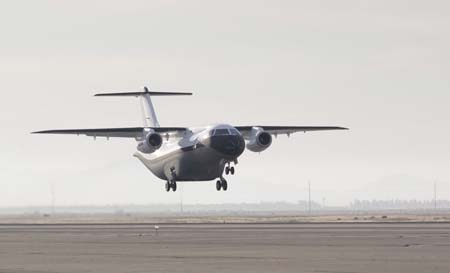The Air Force and  Lockheed Martin flew the experimental Advanced Composite Cargo Aircraft for the first time on Tuesday at the service’s Plant 42 in Palmdale, Calif. The initial demonstration flight lasted about 87 minutes. “The aircraft was a real pleasure to fly and we experienced absolutely no issues,” said Rob Rowe, Lockheed’s lead ACCA test pilot, said in the company’s release. The ACCA is a modified Dornier 328J aircraft on which Lockheed has replaced the mid/aft fuselage and empennage with a structure of advanced composite materials fabricated using novel manufacturing techniques. It is intended as a proof-of-concept platform to show the viability of these new manufacturing techniques to drastically reduce the cost and complexity of building future airlifters compared to traditional metallic designs. For example, despite the somewhat larger size of the Dornier after the composite modifications, the total number of parts was dramatically reduced relative to the original metallic design (approximately 300 versus 3,000), as was the number of mechanical fasteners (about 4,000 vs. 30,000). Barth Shenk, ACCA program manager with the Air Force Research Lab at Wright-Patterson AFB, Ohio, called the maiden flight the culmination of years of teamwork between government and industry “to fundamentally change” how aircraft are made. (Includes Wright-Patterson report by Derek Kaufman)
Lockheed Martin flew the experimental Advanced Composite Cargo Aircraft for the first time on Tuesday at the service’s Plant 42 in Palmdale, Calif. The initial demonstration flight lasted about 87 minutes. “The aircraft was a real pleasure to fly and we experienced absolutely no issues,” said Rob Rowe, Lockheed’s lead ACCA test pilot, said in the company’s release. The ACCA is a modified Dornier 328J aircraft on which Lockheed has replaced the mid/aft fuselage and empennage with a structure of advanced composite materials fabricated using novel manufacturing techniques. It is intended as a proof-of-concept platform to show the viability of these new manufacturing techniques to drastically reduce the cost and complexity of building future airlifters compared to traditional metallic designs. For example, despite the somewhat larger size of the Dornier after the composite modifications, the total number of parts was dramatically reduced relative to the original metallic design (approximately 300 versus 3,000), as was the number of mechanical fasteners (about 4,000 vs. 30,000). Barth Shenk, ACCA program manager with the Air Force Research Lab at Wright-Patterson AFB, Ohio, called the maiden flight the culmination of years of teamwork between government and industry “to fundamentally change” how aircraft are made. (Includes Wright-Patterson report by Derek Kaufman)
After months of debate and sometimes public tension, the Space Force and Intelligence Community are making progress on establishing ways to work together, officials said this week—to the point where one predicted there will soon be “a sharing of data like we've never seen before.”